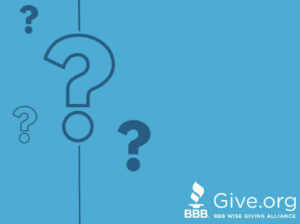Donor Trust Report Finds Religious Groups No Longer Most Trusted Charities
The Better Business Bureau's annual report found that older generations still trust religious groups, but overall they have fallen to third.

Religious organizations are no longer the most trusted charities, according to the released by the BBB Wise Giving Alliance (Give.org).

Religious organizations topped the list from its inception in 2017 until 2022, but fell to third this year. Veterans organizations and not-for-profit hospitals now rank more highly as the most trusted charities for American donors.
Religious groups are still the most highly trusted charity category by the “Mature” and “Boomer” generations. In all, 34.8% of Matures (age 76-93) ranked religious organizations as their most highly trusted charity in contrast to only 18.4% of Generation Z (age 18-24). Gen Z is more likely to trust social service charities, animal welfare groups, and international relief organizations.
Despite these findings in the Donor Trust Report, generosity towards religious organizations grew by 5.2% between 2021 and 2022 despite total U.S. charitable giving declining overall, according to the Giving USA: The Annual Report on Philanthropy published by Giving USA Foundation. An estimated $143.57 billion was given to religious charities in 2022.
Donors believe it is essential to trust a charity before giving. The Donor Trust Report found 69.9% of participants agree in the importance of trusting a charity before donating to it — up from 63.9% in 2021.
While a large majority of respondents place value on trusting a charity, only 20% actually say they highly trust charities. Give.org concludes, “There is ample space to build trust in the sector.”
Access to MinistryWatch content is free. However, we hope you will support our work with your prayers and financial gifts. To make a donation, click here.
While givers may not highly trust charities, they trust them more than they trust other societal institutions like government and media. And the divide is wide: 85% of respondents trust charities more than they trust the media, and 83% trust charities more than government.
Most donors seem to base their determination on the charity’s own reports of its accomplishments—59% percent look to the accomplishments shared by the organization while about 32% look to the evaluation by a third party group. Lowest on the list of important contributors to a charity’s trustworthiness at 6% were celebrity endorsements and the charity’s size.
All generations are most persuaded by a charity’s own reports, but older generations are more vested in third party evaluations—35% of Matures and 38% of Boomers (age 57-75). Gen Zers are more swayed (38%) by the “passion and sincerity of appeals.”
The same is true across all income levels—the accomplishments an organization shares are the most persuasive category in deciding whether the charity is trustworthy. Perhaps unsurprising, those in higher income levels look at financial ratios and third party evaluations also.
Of donors making over $200,000 a year, 50% look at the charity’s financial ratios and 45% look at third party evaluations.
The most likely factor to deter higher income givers from a charity was “a high portion of every dollar received last year was spent on fundraising and management expenses.”
Consistently, most (53%) donors believe the most impactful way to give is through an in-kind donation. However, volunteering one’s time saw a resurgence after falling the last couple years. Forty five percent of respondents chose it as one of the most impactful ways to help—up from 38% last year.
Give.org surveys more than 2,100 adults across the United States to explore how the public feels, thinks, and intends to act around charity trust and generosity. The results are published annually in the Donor Trust Report.
According to its website, BBB Wise Giving Alliance “provides charity reports, which help donors review charities and find a trustworthy charity to support.” It also conducts assessments to help charities improve their practices and increase trust.



